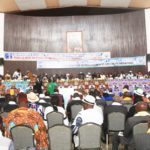Government seems to have pulled out the reconstruction file of the National Oil Refining Company, SONARA, from its drawer.
Members of the steering committee in charge of the implementation of the reconstruction and restructuring plan of the National Oil Refining Company, SONARA, met on Thursday in Limbe, South West region.
The committee discussed how to rebuild SONARA in accordance with a plan hatched in May 2019. The meeting held at the conference hall of refinery and was chaired by the president of the committee, the Minister of Finance Louis Paul Motaze. In the presence of the Water and Energy Minister, Gaston Eloundou Essomba, and the Minister Delegate to the Minister of Planning and Regional Development, Paul Tasong – all members of the committee.
In his address to committee members and invitees at the start of the meeting, Minister Motaze said President Paul Biya was particular about the plan. Although the minister said the project was daunting he was at the same hopeful that it will be accomplished. “President Paul Biya had given a go ahead to this project of SONARA, proposed within the framework of the Inter-ministerial Committee, with its mission being to rehabilitate state-owned and controlled corporations,” he said. “Believe me, since my appointment in the government, there has never been a project as complex as this one. This is not just an ordinary assignment. We are talking about SONARA and it is in the South West region. It is a quite complex task. We will need all necessary expertise to ensure we succeed in this task. I want you to put your trust in us”, Minister Motaze said.
Minister Motaze said the committee will validate a draft partnership agreement with the construction companies, and an action plan. The Motaze committee will ensure the strict respect of the terms of the public-private partnership during the reconstruction of the oil refinery. To carry out these duties assigned to the committee its head said a firm will be recruited. The committee will also supervise and validate the procedure for selecting the contractors.
Government will just have to dust up the 2010 modernisation plan of SONARA which was stopped by the fire incident of 2019. It hinged on renewal of equipment and production tools of the refinery. Authorities hoped to increase the refinery’s production capacity from 2.1 to 3.5 million tonnes. The project was ambitious as authorities envisaged the installation of a hydrocracking system to refine heavy crude oil in Cameroon.
Bringing the refinery up-to-date was estimated at FCFA 500 billion. Cameroon was for once going to refine its heavy crude instead of the imported light one transformed by the facility. The fire left only part of the refinery functioning. Findings about the fire have not been made public. And government has not officially dispelled the rumour that it was a criminal act.
Jude Viban, With Field Reports




